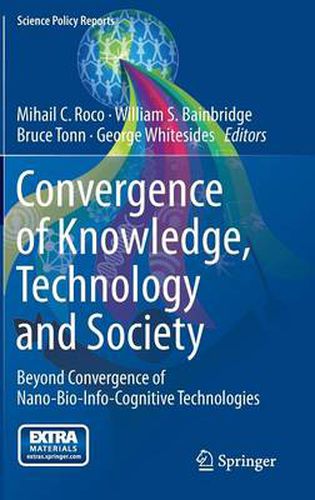Readings Newsletter
Become a Readings Member to make your shopping experience even easier.
Sign in or sign up for free!
You’re not far away from qualifying for FREE standard shipping within Australia
You’ve qualified for FREE standard shipping within Australia
The cart is loading…






This title is printed to order. This book may have been self-published. If so, we cannot guarantee the quality of the content. In the main most books will have gone through the editing process however some may not. We therefore suggest that you be aware of this before ordering this book. If in doubt check either the author or publisher’s details as we are unable to accept any returns unless they are faulty. Please contact us if you have any questions.
This volume aims to document the most important worldwide accomplishments in converging knowledge and technology, including converging platforms, methods of convergence, societal implications, and governance in the last ten years. Convergence in knowledge, technology, and society is the accelerating, transformative interaction among seemingly distinct scientific disciplines, technologies, and communities to achieve mutual compatibility, synergism, and integration, and through this process to create added value for societal benefit. It is a movement that is recognized by scientists and thought leaders around the world as having the potential to provide far-reaching solutions to many of today’s complex knowledge, technology, and human development challenges. Four essential and interdependent convergence platforms of human activity are defined in the first part of this report: nanotechnology-biotechnology-information technology and cognitive science ( NBIC ) foundational tools; Earth-scale environmental systems; human-scale activities; and convergence methods for societal-scale activities. The report then presents the main implications of convergence for human physical potential, cognition and communication, productivity and societal outcomes, education and physical infrastructure, sustainability, and innovative and responsible governance. As a whole, the report presents a new model for convergence. To effectively take advantage of this potential, a proactive governance approach is suggested. The study identifies an international opportunity to develop and apply convergence for technological, economic, environmental, and societal benefits. The panel also suggests an opportunity in the United States for implementing a program aimed at focusing disparate R and D energies into a coherent activity - a Societal Convergence Initiative . This study received input from leading academic, industry, government, and NGO experts from the United States, Latin America, Europe, Asia, and Australia.
$9.00 standard shipping within Australia
FREE standard shipping within Australia for orders over $100.00
Express & International shipping calculated at checkout
This title is printed to order. This book may have been self-published. If so, we cannot guarantee the quality of the content. In the main most books will have gone through the editing process however some may not. We therefore suggest that you be aware of this before ordering this book. If in doubt check either the author or publisher’s details as we are unable to accept any returns unless they are faulty. Please contact us if you have any questions.
This volume aims to document the most important worldwide accomplishments in converging knowledge and technology, including converging platforms, methods of convergence, societal implications, and governance in the last ten years. Convergence in knowledge, technology, and society is the accelerating, transformative interaction among seemingly distinct scientific disciplines, technologies, and communities to achieve mutual compatibility, synergism, and integration, and through this process to create added value for societal benefit. It is a movement that is recognized by scientists and thought leaders around the world as having the potential to provide far-reaching solutions to many of today’s complex knowledge, technology, and human development challenges. Four essential and interdependent convergence platforms of human activity are defined in the first part of this report: nanotechnology-biotechnology-information technology and cognitive science ( NBIC ) foundational tools; Earth-scale environmental systems; human-scale activities; and convergence methods for societal-scale activities. The report then presents the main implications of convergence for human physical potential, cognition and communication, productivity and societal outcomes, education and physical infrastructure, sustainability, and innovative and responsible governance. As a whole, the report presents a new model for convergence. To effectively take advantage of this potential, a proactive governance approach is suggested. The study identifies an international opportunity to develop and apply convergence for technological, economic, environmental, and societal benefits. The panel also suggests an opportunity in the United States for implementing a program aimed at focusing disparate R and D energies into a coherent activity - a Societal Convergence Initiative . This study received input from leading academic, industry, government, and NGO experts from the United States, Latin America, Europe, Asia, and Australia.